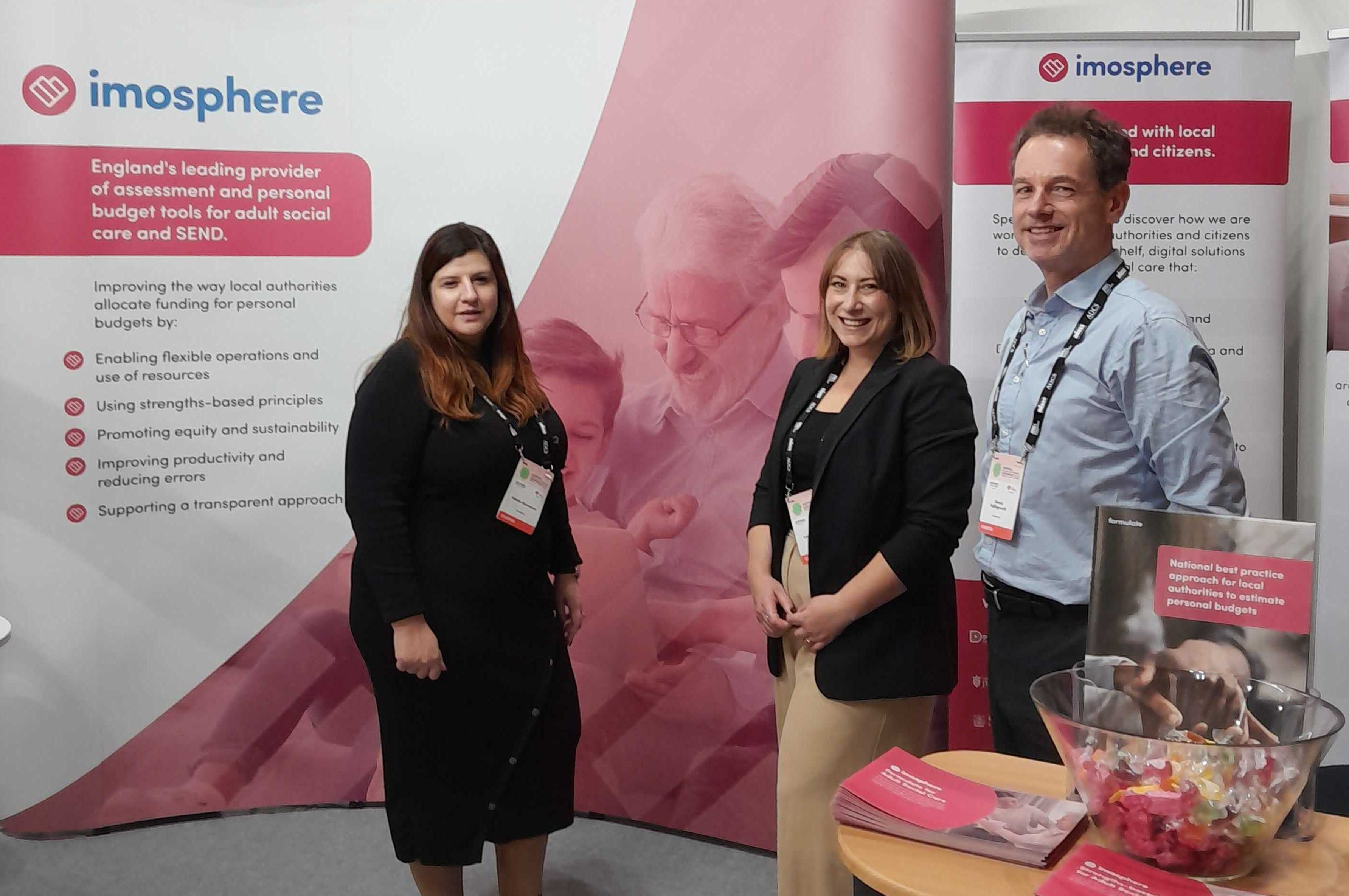Insights from the National Children and Adult Services Conference
Adult social care leaders came together in Bournemouth last week for the National Children and Adult Services Conference (NCASC). Natalie Kenneison, Chief Operating Officer at Imosphere, reflects on the key conference highlights.
 Natalie, Laura and Dennis at NCASC 2023
Natalie, Laura and Dennis at NCASC 2023
Laura (Senior Product Manager), Dennis (Senior Sales Consultant) and I are back from yet another great NCASC event. This provided us with a valuable opportunity to connect with professionals directly involved in social care and education, gaining insights into the genuine challenges faced on the front lines and witnessing the innovative solutions emerging in the sector.
Highlights from the conference include:
Wednesday
Co-Creation in Care: Lessons from Bristol on Person-Centred Approaches
Highlights from ‘How do we co-create care and support that is person centred, equitable and inclusive?’ – hosted by SCIE, TLAP and Bristol
Bristol has uncovered valuable lessons to share. Effective co-production demands open two-way communication and relies on trust as its cornerstone. It’s about going beyond ‘the obvious’ and finding fresh and innovative avenues to connect with a diverse range of people who bring lived experiences to the table.
Co-production is a journey laden with emotions. Expect challenging conversations, but also anticipate an evolution of dialogue as we unearth the true issues at hand.
Crucially, there’s a need to distinguish between mere consultation and genuine co-production. It is an opportunity to harness the collective expertise of individuals, allowing them to actively shape services, drive meaningful changes, and make a real impact.
Unlocking the Dance: Capacity and Demand Planning in Social Care and NHS Collaboration
Highlights from ‘The importance of capacity and demand planning’ – hosted by Partners in Care and Health, Professor John Bolton and Telford and Wrekin
There is an intricate dance between Adult Social Care and the NHS, where collaboration becomes the key to effective capacity and demand planning. While the spotlight often shines on hospital discharges, it’s not just about securing enough beds in care homes.
The magic lies in aligning the right services with the right capacity, strategically placing them where they are needed most, all while keeping an eye on the future. The crucial task at hand is ensuring individuals are discharged onto the correct pathway, preventing unnecessary delays in accessing care beds.
There are complexities behind misguided discharges – a mix of risk aversion and decisions driven by perceived dependence in a hospital setting. Pathway 0 holds the spotlight, with more days lost than Pathways 1, 2, and 3 combined, prompting us to question how we determine the ideal post-hospital destination for each individual.
It’s time to revolutionise commissioning and tailoring services to support Pathways 0 and 1. Think therapeutic settings and innovative rehab facilities as we navigate the intricate landscape of healthcare planning for a brighter and more efficient future.
Thursday
AI in Action: Norfolk’s Innovative Approach to Preventing Falls
Highlights from ‘Artificial intelligence (AI): the future of prevention?’ hosted by Norfolk County Council
Imagine being in a room packed to the brim with enthusiasm (standing room only!), and the highlight of the week was none other than our fantastic customer, Norfolk!
They’ve taken on the challenge of identifying individuals at risk of falls, leveraging LAS data as a starting point. Their machine learning model, powered by Natural Language Processing (NLP), sifts through assessment, case notes, and care planning data to pinpoint those at risk – achieving an impressive 70% accuracy rate.
Once the identification is made, Norfolk County Council steps in for a comprehensive approach. They engage in meaningful conversations with individuals and provide tailored support, which includes interventions like fire service home safety visits, technology integration, handyperson/home repairs, reablement, exercise classes, befriending, and NHS falls assessments.
Beyond the tech and interventions, Norfolk emphasises the importance of data-driven decision-making and outcome evidence. It’s not just about AI; it’s about utilising data and analytics effectively, tracking outcomes, and acknowledging its significance in the process.
Measuring prevention is no small feat, but Norfolk turns to Public Health resources for guidance on quantifying the impact of prevention. So far, the results are impressive: 100% of those contacted experienced no falls, and 15% reported a reduction in their fear of falling.
Looking ahead, Norfolk plans to conduct a long-term review to assess whether care packages have increased or if individuals have transitioned to residential care – an added layer of evaluation.
Yet, amid these accomplishments, Norfolk raises thought-provoking ethical questions. Is it ethical to intervene in people’s lives using technology without their explicit request? On the flip side, is it ethical to possess such technology and not use it to enhance people’s lives? These inquiries leave us with much to ponder.
Ministerial Insights: Addressing Challenges and Opportunities in Social Care
Highlights from the plenary session with the Minister of State for Social Care - Helen Whately MP
Minister Whately highlighted a notable surge in the delivery of care packages, marking an unprecedented era in social care.
She underscored the pivotal role of caregivers and stressed the crucial need to provide them with appropriate support.
The pilot phase of Care Quality Commission (CQC) inspections for adult social care was deemed immensely valuable. Minister Whately encouraged local authorities to perceive this as an opportunity for improvement.
During the engaging Q&A session, audience inquiries delved into the escalating costs of care. Topics ranged from the impact of the national minimum wage to the delicate balance local authorities must strike between supporting citizens and maintaining fiscal responsibility.
Participants also raised compelling questions about the imperative of educating the broader population on the experiences of individuals in social care. Minister Whately pointed out that while people grasp the intricacies of health services, there’s a knowledge gap when it comes to understanding social care. This includes nuances related to those with learning disabilities, significant mental health challenges, and young people with physical disabilities. Social care, she emphasised, extends far beyond the realm of care for older individuals. The need for broader societal awareness and understanding was a recurring theme in the discussions.
Friday
CQC Assurance: Lessons from the Pilots and Strategies for Success
Highlights from CQC assurance: learning from the pilots and SLI approaches - hosted by Lincolnshire County Council, North Lincolnshire Council, Carers Trust, and Partners in Care and Health.
Lincolnshire and North Lincolnshire’s tales from the CQC pilot inspections offer a genuine glimpse into the preparation and reality of these assessments.
The session provided a unique opportunity to connect with young carers and young adult carers through innovative methods. Themes from the helpline, carer awareness training, and collaboration with children’s services for transitions were explored.
A fresh theme emerging is the mental health of carers, requiring a pivot in response to address it appropriately.
The inspections serve as a chance for self-awareness, helping identify challenges and gauging how partners and those with lived experiences perceive the service.
Interestingly, many staff in adult social services have limited recollection of past inspections, suggesting seeking advice from counterparts in children’s services for effective preparation.
For an external perspective and a confidence boost, seeking support from advisors such as Partners in Care and Health proves beneficial. They can offer valuable insights and conduct mock interviews to enhance staff confidence.
In the Q&A session, a significant point was raised about the importance of closer collaboration between sites and their case management and assessment providers before, during, and after assessments. This ensures seamless support for any improvement plans that may arise.
Conclusion
In summary, NCASC provided an excellent platform to connect with our current clients and an opportunity to interact with various other local authorities to exchange insights. The Imosphere networking drinks reception on Wednesday evening was particularly delightful, offering a chance for all in attendance to comprehend the primary concerns of other LAs and learn intriguing insights about different regions.
Our time spent with fellow exhibitors, Peopletoo and Channel 3 Consulting, was highly enjoyable. It allowed us to gain a deeper look into the valuable work they undertake in supporting local authorities, and exchange knowledge.
We eagerly anticipate the opportunity to meet with everyone again next year!
